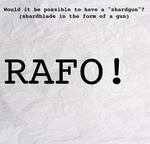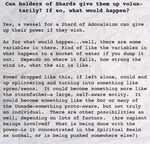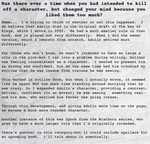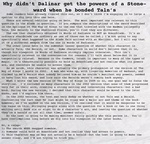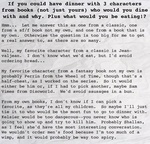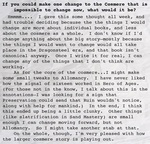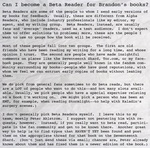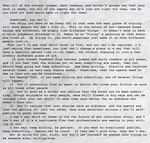Brandon Sanderson
This chapter, which Raoden and Galladon crouching atop the rooftop and watching for newcomers, reminds me of the early days of conceiving this novel. The seed for Elantris actually came several years before I got around to writing the book. I knew that I wanted to tell the story of a brutal city filled with people who has some sickness that kept them from dying.
One of the initial scenes that came to my mind was that of the main character crouching atop a low building, watching the gates to the city. The gates open, and a newcomer is thrown in. At the same time, one of the wretches inside the city snaps–finally giving into his pain, and going mad. This man madly rushes toward the gates, trying to escape. The city guards–who don't have the disease–throw massive spears at the man rushing the gates. One of the spears hits him, piercing him all the way through.
However, it's quickly explained that the spear wasn't meant to kill, for the man continues to struggle weakly, despite being impaled. However, the spear is so big and bulky that the poor creature can't move any more–obviously, the weapons are intended to slow and immobilize, not kill. After all, the inhabitants of this city can't be killed. The man gives up struggling, and lays there limply, whimpering with the massive spear stuck through his chest.
At the same time, another sick one approaches the main character. "–Insert name– went mad last night," he whispers to the main character. "You are now the eldest." Meaning, of course, that the main character is now the person who's been in the city the longest without having gone mad.
You should be able to see the evolution of this scene in the story that I eventually told. Many of the concepts are the same, though I changed the viewpoint character from a person who had been in the city for a long time to a newcomer who still had his optimism. I also shifted much of the focus of the novel to what was happening outside the city, adding the two other viewpoint characters. However, this scene still remains in my mind–it's actually the only real scene I can remember from the very early days of planning Elantris. As an homage to it, I left in the large, bulky spears carried by the Elantris City Guards. Hrathen mentions them in the previous chapter. Though the guards no longer carry them for the same purpose–indeed, the guard probably wouldn't even know what to do with them in case of an attack–I thought this little inside reference to be an interesting one.

